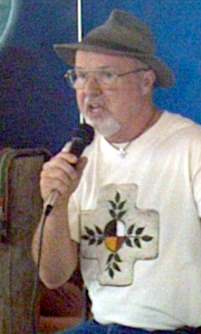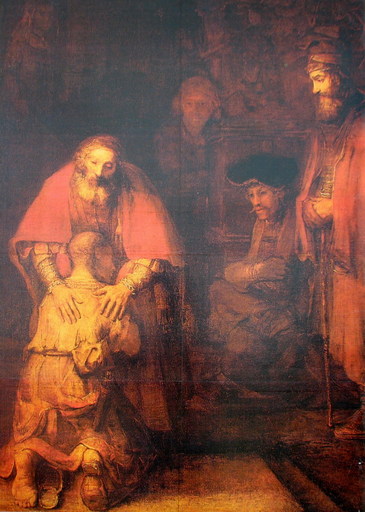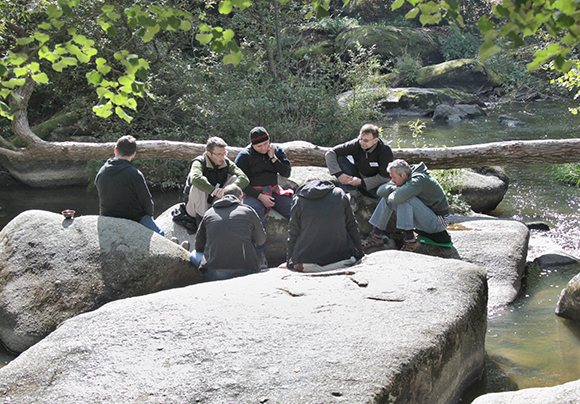
Starý muž, který se neumí smát, je trouba.
Richard Rohr
Kdo jsme?
Tento web reprezentuje hnutí Chlapi, neformální společenství mužů, kteří hledají takové způsoby duchovního prožívání, se kterými se dokážou jako muži ztotožnit a celou bytostí je žít.
Můžeš se tady setkat s muži, kteří usilují o to být lepšími a více autentickými.
Vytváříme jak reálný tak virtuální prostor pro setkávání.
Začalo to někdy před rokem 2000 hledáním mužské energie, spirituality i chlapské party a setkáváním v malých skupinách. Pokračovalo to inspirací dílem Richarda Rohra a jeho Rituálem pro přechod do zralé dospělosti a pokračuje to dodnes stovkami setkání v malých skupinách, víkendovými akcemi pro muže i pro otce a děti, rituály i celostátními setkáními pro stovky účastníků a mezinárodní spoluprací s hnutím mužů po celém světě.
Pro řadu z nás je podstatné přátelství s Bohem, pro všechny jsou oporou kamarádi, které tu nalezli.
Vítáme tě mezi námi a těšíme se na společné putování.

Pavel Hrdina a Martin Šmídek
Překlad meditace CAC z neděle 10. 9. 2023
na téma:
Okraj vnitřku
| Pravé centrum Tento týden začneme meditace základním učením Richarda Rohra o tom, co znamená být "na okraji nitra": Bibličtí proroci byli z definice vidoucími a hledači Věčného tajemství, které se starým očím a všem současným zájmům o status a bezpečí zdá vždy nebezpečně nové a kacířské. Hebrejští proroci žili na okraji nitra judaismu. Jan Křtitel později činí totéž s chrámovým judaismem a Pavel pak ostře nesouhlasí s Petrem a novým křesťanským establishmentem v Jeruzalémě (Gal 2,1-14). František a Klára pokračovali v tomto klasickém vzoru ve svém rodném městě Assisi, když se fyzicky přesunuli z horního Assisi mezi majores do dolní části města a minores. Tam nemuseli nic dokazovat ani obhajovat. Nabízelo to nejvíce příležitostí k čerstvým a upřímným zkušenostem a k nalezení jejich Pravého středu. [1] Východiskem pro biblického proroka je úžasná pozitivní zkušenost teofanie (jak vidíme například u Izajáše 6), která naplňuje jejich srdce, ne cynismem, ne sarkasmem, ne negativismem, ne odporem, ale extází, kterou je třeba sdílet. Tato jediná zkušenost absolutna je natolik absolutizující, že má za následek relativizaci všeho ostatního. Relativizuje dokonce i náboženské instituce, které proroci neustále a nepřetržitě kritizují. Téměř dokonale to vidíme zopakované u Ježíše. Ježíš neustále kritizuje náboženství a je náboženstvím potírán. Proroci vycházejí z náboženské zkušenosti, a přesto proti nim nejvíce bojuje právě náboženství. Často jsou stejně jako Ježíš náboženským establishmentem zabiti. Proč tomu tak je? [2] Lidé, kteří se skrývají uvnitř systémů sounáležitosti, jsou velmi ohroženi těmi, kteří do této skupiny nepatří. Ohrožuje je každý, kdo našel svou příslušnost v místech, která nemohou ovlivnit. Křesťané toto místo nazývají "Boží vláda". Když člověk nalezne svůj poklad jinde a je zcela zakotven ve vášni a patosu transcendentního Boha, je nezničitelný a zároveň nekontrolovatelný světskými systémy. Podíváme-li se na některé z těch, kteří v moderní době plnili prorockou úlohu, jako Martin Luther King mladší, Dietrich Bonhoeffer, Dorothy Day, papež Jan XXIII, Simone Weil a Óscar Romero, všimneme si, že všichni zastávali přesně tento postoj. Měli tendenci být, každý svým způsobem, ortodoxními, konzervativními, tradičními duchovními, intelektuály nebo věřícími; ale tato skutečně autentická vnitřní zkušenost a příslušnost jim umožňovala naprosto kritizovat právě ty systémy, jejichž byli součástí. Dalo by se říci, že jejich osvícené činy objasňují, co naše pouhé systémy víry skutečně znamenají. Tito proroci kritizovali křesťanství právě těmi hodnotami, které se z křesťanství naučili. [4] Fr. Richard Rohr, OFM přeloženo DeepL | The True Center
We begin this week’s meditations with a foundational teaching from Richard Rohr on what it means to be “on the edge of the inside”: The biblical prophets, by definition, were seers and seekers of Eternal Mystery, which always seems dangerously new and heretical to old eyes and any current preoccupations with status and security. The Hebrew prophets lived on the edge of the inside of Judaism. John the Baptist later does the same with Temple Judaism, and Paul then sharply disagrees with Peter and the new Christian establishment in Jerusalem (Galatians 2:1–14). Francis and Clare continued this classic pattern in their own hometown of Assisi as they physically moved from upper Assisi among the majores to the lower side of town and the minores. There they had nothing to prove or defend. It offered the most opportunities to have fresh and honest experience, and to find their True Center. [1] The starting point for the biblical prophet is an amazing positive experience of theophany (as we see in Isaiah 6, for example) that fills their heart, not with cynicism, not with sarcasm, not with negativity, not with opposition, but with ecstasy that has to be shared. That one experience of the absolute is so absolutizing that it has the effect of relativizing everything else. It even relativizes the institutions of religion, which receive the prophets’ most constant and continuous criticism. We see this almost perfectly replicated in Jesus. Jesus is constantly critiquing religion and being fought by religion. The prophets come out of religious experience, and yet they find themselves fought most by religion itself. Often, like Jesus, they are killed by the religious establishment. Why is that true? [2] People hiding inside of belonging systems are very threatened by those who are not within that group. They are threatened by anyone who has found their citizenship in places they cannot control. Christians call this place “the Reign of God.” When one has found one’s treasure elsewhere and is utterly grounded in the passion and pathos of a transcendent God, they are both indestructible and uncontrollable by worldly systems. If we look at some who have served the prophetic role in modern times, like Martin Luther King Jr., Dietrich Bonhoeffer, Dorothy Day, Pope John XXIII, Simone Weil, and Óscar Romero, we will notice that they all held this exact position. They tended to be, each in their own way, orthodox, conservative, traditional clergy, intellectuals, or believers; but that truly authentic inner experience and membership allowed them to critique utterly the exact systems of which they were a part. We might say that their enlightened actions clarify what our mere belief systems really mean. These prophets critiqued Christianity by the very values that they learned from Christianity. [4] Fr. Richard Rohr, OFM |
[1] Adapted from Richard Rohr, Eager to Love: The Alternative Way of Francis of Assisi (Cincinnati, OH: Franciscan Media, 2014), xxi–xxii.
[2] Adapted from Richard Rohr and Joan Chittister, Prophets Then, Prophets Now (Albuquerque, NM: Center for Action and Contemplation, 2006). Available as MP3 download.
[3] Adapted from Richard Rohr, “On the Edge of the Inside: The Prophetic Position,” Radical Grace 25, no. 4 (Fall 2012): 26.
Zde se nacházejí překlady Daily Meditations, jejichž anglické originály se nacházejí na webu CAC. V den jejich vydání je zde nalezneš přeložené strojově pomocí DeepL, zpravidla do druhého dne pak projdou jazykovou úpravou někým z týmu překladatelů :-) Pokud vládneš dobrou angličtinou, přihlas se asi raději přímo u zdroje těchto úvah, tedy na webu CAC. Budeš je pak do své mailové schránky dostávat již k ranní kávě. -mš-
 Myšlenka Richarda Rohra na první neděle postní - Milost Boží láska je naprostá, bezpodmínečná, absolutní a je navždycky. Stav milosti – totiž Boží přístup k nám – je věčný. Jen my jsme ti, kteří se mění. Někdy jsme schopni uvěřit, že nás Bůh miluje bezpodmínečně, absolutně a navždy. A to je milost! Jindy zas, když jsme schlíplí a zatížení pocitem viny, strachu a tíže, nejsme schopni uvěřit, že nás Bůh miluje. …
Myšlenka Richarda Rohra na první neděle postní - Milost Boží láska je naprostá, bezpodmínečná, absolutní a je navždycky. Stav milosti – totiž Boží přístup k nám – je věčný. Jen my jsme ti, kteří se mění. Někdy jsme schopni uvěřit, že nás Bůh miluje bezpodmínečně, absolutně a navždy. A to je milost! Jindy zas, když jsme schlíplí a zatížení pocitem viny, strachu a tíže, nejsme schopni uvěřit, že nás Bůh miluje. …




